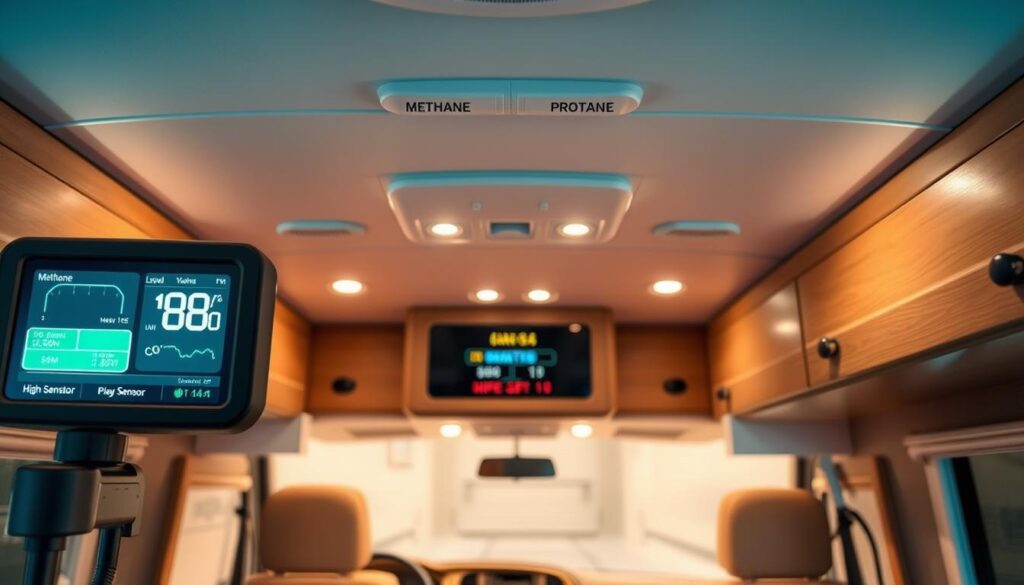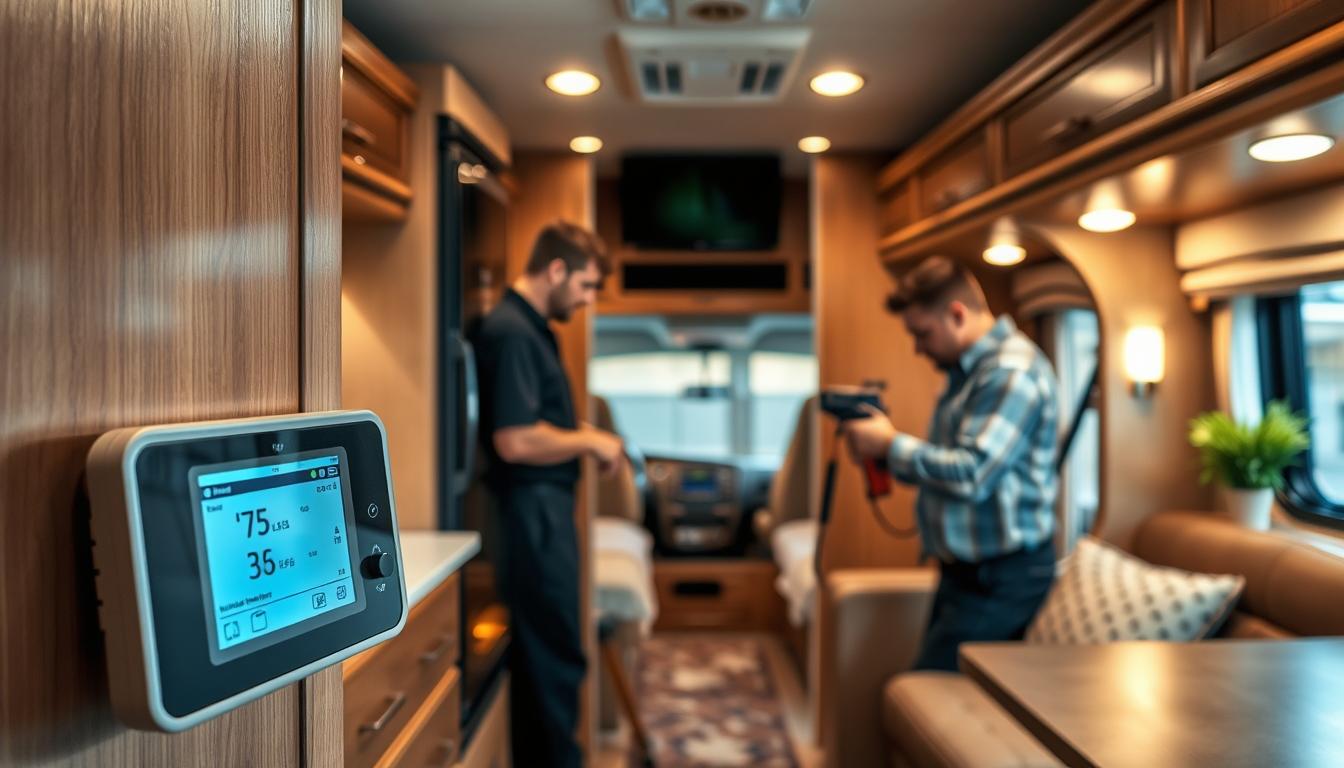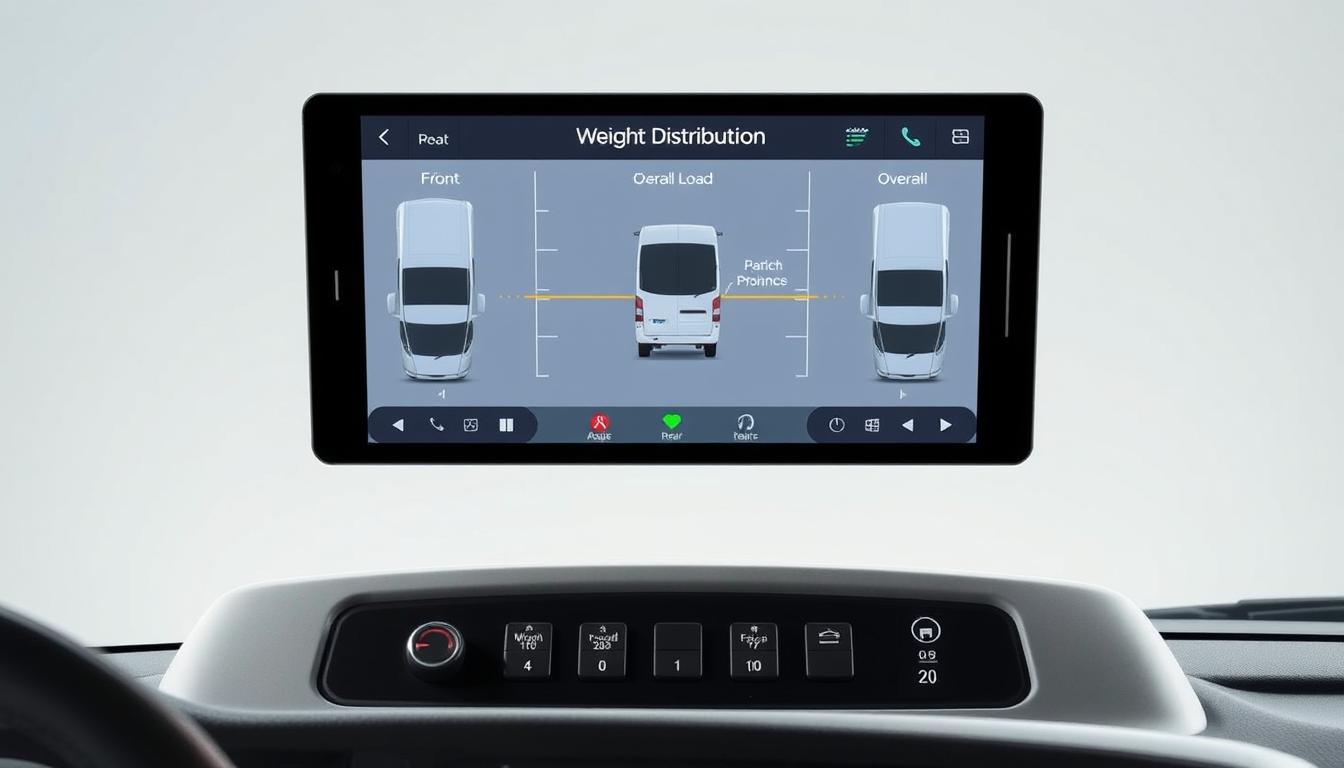Gas Leak Monitoring in Class C Motorhomes via Apps
Have you ever thought about how your Class C motorhome might be at risk for gas leaks while traveling? In today’s world, keeping your RV safe from gas leaks is more important than ever. Thanks to mobile apps, checking your vehicle’s safety is now easier and more efficient than before.
This article explores why gas leak monitoring is key for Class C motorhomes. It also shows you the latest mobile apps that send real-time alerts. These apps help you stay safe on your travels.
Introduction to Gas Leak Monitoring
Gas leak monitoring is key for RV safety, especially in Class C motorhomes. These use propane for cooking and heating. Advanced sensors in these systems detect harmful gases, keeping everyone safe. They also provide real-time data on gas levels and warn of dangers.
It’s vital for RV owners to know about gas detection. Leaks can cause explosions or carbon monoxide poisoning. Using gas leak monitoring systems greatly lowers these risks.
Today’s RV safety tech has improved a lot. This has led to better gas monitoring solutions. These systems work with mobile apps, sending alerts and helping users act fast. Focusing on gas leak detection keeps people safe and gives them peace of mind while traveling.

Importance of Gas Leak Detection in RVs
Gas leak detection is key to keeping RV occupants safe. It’s crucial to know the dangers of gas leaks, especially in Class C motorhomes. These vehicles have tight spaces, making it urgent to have good detection systems.
Health Risks Associated with Gas Leaks
Gas leaks can cause serious health issues. Gases like propane can lead to headaches, nausea, and even breathing problems. Long-term exposure can be even worse. It’s important for RV users to watch gas levels closely.
Why Class C Motorhomes are Vulnerable
Class C motorhomes are at risk for gas leaks because of their small size. They have less air, making gas buildup more likely. With many gas appliances, the chance of a leak is higher. RV owners need to know this to stay safe.

Types of Gas Detectors for Motorhomes
Knowing about the different gas detectors for motorhomes is key for a safe trip. There are various detectors, mainly divided into analytical methods and physical gas sensors. Each type works in its own way to monitor gases.
Analytical Methods of Gas Detection
Analytical gas detection uses advanced tech for accurate gas type identification. These detectors have special sensors for gases like methane, propane, or carbon monoxide. They give detailed gas composition analysis, helping to take the right safety steps.
These systems are great for places where gas mixtures are risky. They allow for quick action and prevention.
Physical Gas Sensors
Physical gas sensors use simpler tech like semiconductor or electrochemical methods. They are cheaper and easier to set up, making them good for motorhome users. While not as precise as analytical methods, they alert you to gas leaks early.
They are reliable and boost safety in RVs, making them a favorite among RV fans.
Gas Leak Monitoring in Class C Motorhomes
Keeping your Class C motorhome safe from gas leaks is crucial. Using the right monitoring systems is key to a safe trip. These systems check propane levels, which RVs often use. They send alerts right away if they find a leak, keeping everyone safe.
RVs, especially Class C motorhomes, need special monitoring tech. They must fit into small spaces and work well on the road. Many systems have sensors that alert you through apps. This makes traveling safer and less stressful.
By monitoring gas levels, you make your trips safer and more enjoyable. Advanced RV tech ensures your motorhome is a safe place for everyone. This way, every adventure is worry-free and fun.
Introduction to Mobile Apps for Monitoring
In today’s world, mobile apps are key for RV owners to detect gas leaks. These apps give peace of mind and boost safety on the road. They send real-time updates and alerts, helping users fix problems early.
Features of Popular Monitoring Apps
Many gas leak monitoring apps have great features for users. Some top features include:
- Real-time monitoring: Users can watch gas levels all the time, spotting leaks right away.
- Alerts and notifications: Alerts keep users updated when gas levels are not safe.
- User-friendly interfaces: Apps are easy to use, making it simple for everyone.
- Data logging: Logs help users track past data and find patterns.
Compatibility with Different Devices
Device compatibility is also important for gas leak monitoring apps. Most apps work on both iOS and Android, making them accessible to everyone. This is great for RV owners who need to check gas levels anywhere.
By using devices like smartphones or tablets, users can quickly respond to any alerts. This keeps them safe and connected on the move.
Overview of BMPRO ProSmart Monitoring System
The BMPRO ProSmart monitoring system is a top choice for RV gas management and vehicle health. It has many features designed for recreational vehicles. It tracks water levels, propane status, tire pressure, and battery performance.
Detailed Features and Specifications
This system is known for its strong monitoring system features. It uses Bluetooth to connect with up to 40 sensors for real-time data. It works with both iOS and Android, making it easy to check your RV’s status on your phone. Key features include:
| Feature | Description |
|---|---|
| Bluetooth Connectivity | Connects with up to 40 sensors to monitor various parameters. |
| Smartphone Integration | Compatible with both iOS and Android devices for convenient access. |
| Multi-parameter Monitoring | Tracks water, propane, tire pressure, and battery levels. |
Advantages of Using BMPRO for RV Monitoring
The BMPRO ProSmart system offers many benefits for RV monitoring. It ensures safety by alerting you to gas leaks in time. This helps you avoid dangerous situations.
It also gives you peace of mind while traveling. And it makes your RV trips more enjoyable. All thanks to the reliable BMPRO ProSmart.
Wi-Fi Smart Gas Leak Detectors
Wi-Fi gas detectors have changed the way we detect gas leaks. They use advanced sensors to find harmful gases and send data over Wi-Fi. This means users get updates and alerts right away, making RVs safer.
How Do They Work?
Wi-Fi gas detectors keep an eye on the air in RVs all the time. If they find a gas leak, they send a signal over Wi-Fi. This alerts users on their phones quickly, helping avoid dangerous situations.
Benefits of Wi-Fi Connectivity for Safety
Wi-Fi gas monitoring offers many advantages. It lets users check their RV’s air quality from anywhere. They can get alerts on any device, no matter where they are. This makes RV owners feel safer, knowing they can act fast if there’s a gas leak.
Real-Time Alerts and Mobile Notifications
Real-time alerts are key for RV safety. They alert users when gas levels are low or if there’s a leak. This tech keeps travelers safe on the road. Mobile notifications send updates right to your phone, helping you act fast.
How Alerts Work on Apps
Mobile apps watch gas levels all the time. If they find a problem, they send alerts to your phone. These alerts can be simple or urgent, helping you stay safe.
Managing Notifications for User Convenience
It’s important to set up your app alerts just right. You can choose what alerts you get and how often. This makes your safety system better, so you can enjoy your trip while staying safe.
Installation and Setup of Monitoring Devices
Installing gas monitoring devices in Class C motorhomes is crucial for leak detection. This guide will walk you through installing devices like BMPRO ProSmart and Wi-Fi gas detectors. It will help you avoid common installation issues.
Step-by-Step Installation Guide
- Choose the Right Location: Pick a central spot in your motorhome for the gas monitoring device.
- Prepare the Mounting Surface: Clean the area where the device will go, making sure it’s dust-free.
- Follow Manufacturer Instructions: Stick to the setup guide for the device, focusing on wiring and connections.
- Test Connectivity: Check that Bluetooth or Wi-Fi is working right to connect with apps.
- Calibrate the Device: Calibrate the device as the manufacturer suggests to get accurate readings.
Common Installation Challenges
When installing gas monitoring devices, you might face some issues:
- Space in the motorhome can be tight, making placement tricky.
- Setting up Bluetooth or Wi-Fi might need some troubleshooting.
- Configuring notifications and alerts can be confusing.
Maintaining Your Gas Leak Monitoring System
Keeping your gas leak monitoring systems in top shape is key for safety in your motorhome. Regular upkeep ensures these systems work well over time. This part will talk about the basics of maintenance and how to fix common problems with gas detectors.
Regular Checkups and Maintenance Suggestions
Regular care of your gas monitoring systems makes them last longer and work better. Here are some important steps for routine maintenance:
- Test the alarm every month to make sure it works right.
- Change batteries as the maker says, usually every six months or a year.
- Check the sensors for damage or dirt, which can mess with their work.
- Update software through the maker’s app or website for new features and fixes.
How to Troubleshoot Common Issues
Users might run into problems with gas detectors. Knowing how to fix common issues can help RV owners solve problems on their own. Here are some usual problems and how to fix them:
| Issue | Possible Cause | Solution |
|---|---|---|
| Alarm not sounding | Dead battery | Replace the battery right away |
| False alarms | Dirt or dust blocking the sensor | Clean the sensor softly with a cloth |
| Inconsistent readings | Bad detector | Think about getting a new one |
| App not connecting | Wi-Fi problems | Check your router or reset the app |
By keeping your gas leak monitoring systems in good shape and knowing how to fix common problems, you can feel safe while traveling in your motorhome.
Legal and Safety Regulations for RV Gas Monitoring
Knowing the laws about RV gas monitoring is key for RV owners. Following these rules keeps everyone safe and follows state laws. Each state has its own rules for gas leak checks, so it’s important to know them.
Understanding Compliance Standards
Following RV gas monitoring rules means following guidelines from groups like the National Fire Protection Association (NFPA) and the Recreational Vehicle Industry Association (RVIA). These groups set rules for RV makers and owners to follow. Not following these rules can lead to big problems, like fines.
Safety Regulations by State
Gas monitoring safety rules differ by state. Some states require certain gas detectors or regular checks. RV owners need to check their state’s rules to stay safe and legal. Here’s a quick look at some states and their rules:
| State | Gas Detector Requirement | Inspection Frequency |
|---|---|---|
| California | Mandatory dual sensor detectors | Annual inspection |
| Florida | No specific requirements | Regular self-checks recommended |
| Texas | Single sensor detectors required | Biannual inspection |
| New York | Mandatory alarm system integration | Annual inspection |
Knowing and following these safety rules makes traveling safer. It also helps avoid legal trouble. Being aware of state differences is key to a safe RV trip.
User Experiences and Testimonials
Real-world user testimonials offer valuable insights into gas monitoring systems in Class C motorhomes. Many RV owners have shared their experiences. They highlight the importance of reliable detection systems. These success stories show how these systems prevent dangerous situations and ensure peace of mind while traveling.
Case Studies of Successful Detection
Several case studies show how advanced monitoring systems detect gas leaks successfully. For example, an owner of a Class C motorhome reported a gas leak detector alerting them to a propane system malfunction. This timely detection helped them fix the issue before it got worse, proving the systems’ importance in safety.
“Our gas monitoring system saved us from a potentially hazardous situation during a camping trip. We were alerted just in time!”
Feedback on Different Monitoring Systems
User feedback varies on different gas monitoring systems. It highlights their practical benefits and limitations. Many users like the connectivity options of smart devices, allowing for real-time monitoring. Some say systems with Wi-Fi connectivity send more reliable notifications. Others worry about battery life and device sensitivity.
Using user testimonials to evaluate gas monitoring technologies gives a deeper understanding of their effectiveness. The variety of experiences is crucial for potential buyers. It helps them make informed decisions based on real-life applications in RV settings.
Advancements in Gas Leak Technology
The world of gas leak monitoring is changing fast thanks to new tech. RV owners want safer travel, so better tools are being made. Now, we have features like artificial intelligence and machine learning to help find leaks faster and safer.
Emerging Trends in Monitoring Solutions
New gas detection tech brings many cool monitoring solutions. These include:
- Integration of Artificial Intelligence: AI helps find leaks by looking at patterns and predicting problems.
- Machine Learning Applications: These techs learn from you, making alerts more relevant and timely.
- Real-time Data Analytics: Now, you get feedback right away and can look at past data for better choices.
Future Developments to Anticipate
Future tech in gas leak monitoring will bring even more improvements. We can look forward to:
- Enhanced Connectivity: Smart home systems will work better with gas safety tools for easier management.
- Advanced User Interfaces: Apps will be easier to use, making alerts and monitoring simpler.
- Customizable Alerts: You’ll be able to set up alerts just the way you like them, based on your needs.
Conclusion
Gas leak monitoring in Class C motorhomes is very important. This article talked about monitoring systems and how they improve RV safety. With modern technology, RV owners can reduce gas leak risks, making travel safer.
Knowing about gas leak detection methods is key for RV lovers. As technology gets better, gas leak monitoring will keep getting safer. This means more peace of mind on the road.
If you’re starting with a Class C motorhome, don’t forget about gas leak monitoring. Using the latest tech makes your journey safer and more fun. It lets you enjoy the open roads without worry.
FAQ
What types of gases should I monitor in my Class C motorhome?
In Class C motorhomes, you should watch out for propane, carbon monoxide, and natural gas. It’s important to monitor these gases because they can be harmful to your health. They also pose a risk of explosions.
How do gas leak detectors work?
Gas leak detectors use different technologies to find gas leaks. Some use advanced sensors, while others rely on physical devices. They alert you when they detect a gas leak.
Why is mobile app integration important for gas leak monitoring?
Mobile app integration makes it easier to keep an eye on gas levels and leaks. It sends you updates and alerts in real-time. This way, you can quickly respond to any dangers while on the move.
What is the BMPRO ProSmart system?
The BMPRO ProSmart system is a top-notch monitoring system for RVs. It tracks water, propane, tire pressure, and battery levels. You can connect it to your smartphone using an app that works with iOS and Android.
How often should I perform maintenance on my gas leak monitoring system?
You should check your gas leak monitoring system regularly. This includes replacing batteries, updating software, and making sure the detectors work right. Do this at least every six months.
What legal standards should I be aware of regarding gas leak monitoring in RVs?
The laws about gas leak monitoring in RVs vary by state. But generally, you need to follow safety rules for gas appliances and detectors. This ensures your RV is safe to use and helps you avoid legal trouble.
Can I integrate more than one device with my mobile app for monitoring gas levels?
Yes, many apps, like BMPRO ProSmart, let you connect multiple devices. This way, you can monitor different aspects of RV safety all at once.
What are the most significant health risks from gas leaks in RVs?
Gas leaks in RVs can cause headaches, nausea, and even more serious problems like carbon monoxide poisoning. This can be deadly if not treated quickly.
Are there specific challenges when installing gas leak monitoring devices in motorhomes?
Yes, installing gas leak monitoring devices can be tricky. You might face issues like finding the right spot for the devices, dealing with limited space, or accessing power. Always follow the installation instructions carefully to overcome these challenges.
What advancements are being made in gas leak monitoring technology?
New technologies are being developed, like using artificial intelligence and machine learning. These advancements offer better monitoring solutions. They make RVs safer and more enjoyable to use.














